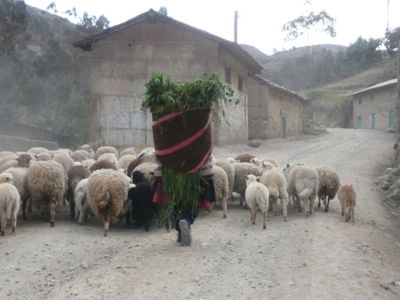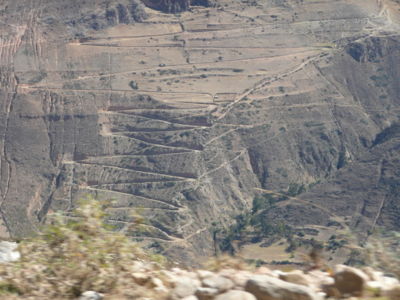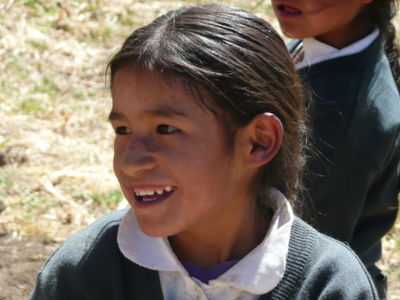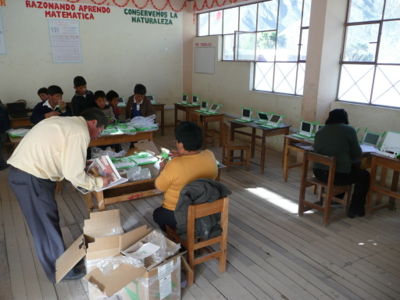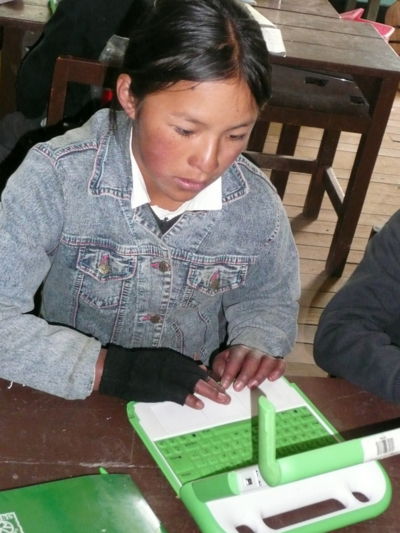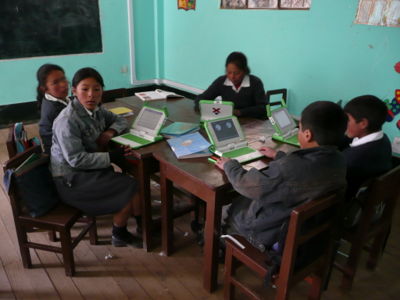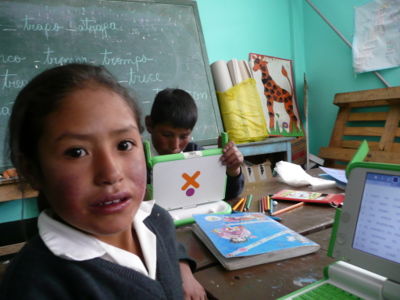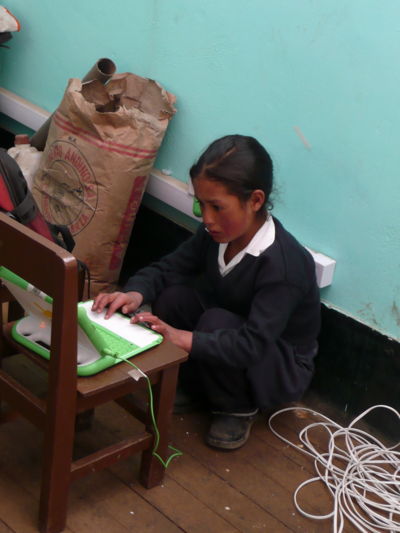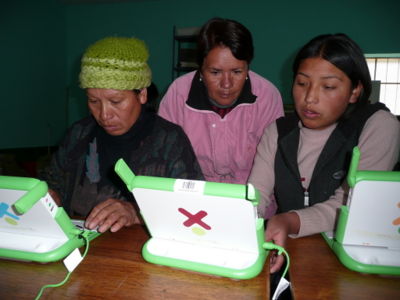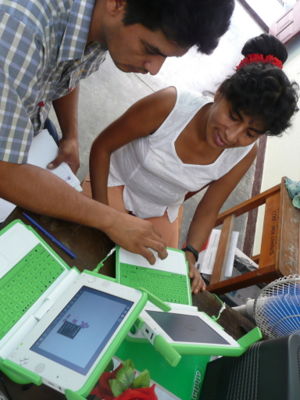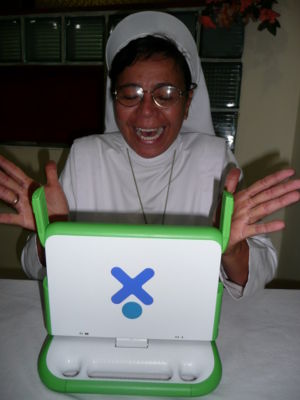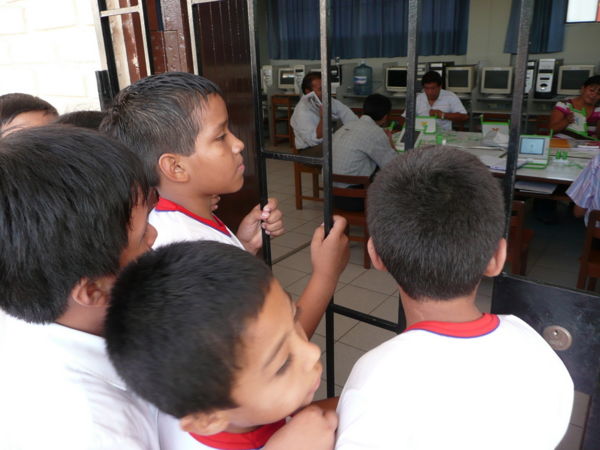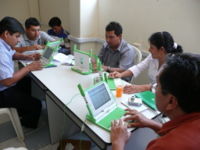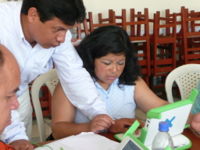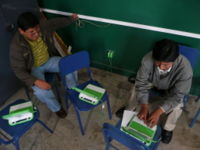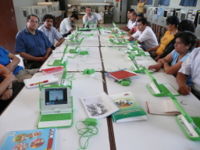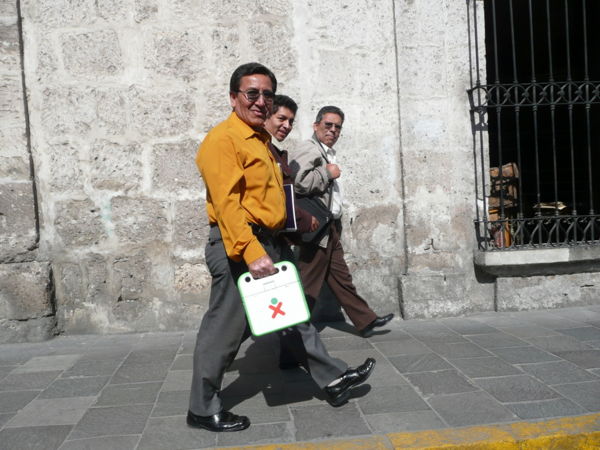OLPC Peru/Revisits: Difference between revisions
(→April) |
(cat) |
||
| (4 intermediate revisions by one other user not shown) | |||
| Line 1: | Line 1: | ||
{{TOCright}} |
{{TOCright}} |
||
Text and Photos by '''[[User:Carla|Carla Gomez Monroy, OLPC]]''' |
Text and Photos by '''[[User:Carla|Carla Gomez Monroy, OLPC]]''' |
||
| Line 32: | Line 32: | ||
Children were playing around while we met the teachers. They had the laptops stored in their boxes in the principal’s office. They had just received the USB key the previous day. Since this was the school were the president of Peru had inaugurated the countrywide OLPC project, some of the laptops were already activated. The teachers, however, had not distributed those laptops to the children. They said they used them in their classes one or two times a week, for an hour or two, and that after that, they placed the laptops back in their boxes until the next lesson with laptops. We started working with the teachers and the principal, first upgrading the laptops, and then activating them. Meanwhile we talked at length with the teachers about the importance of using them more often, of letting the children take the laptops home as the teachers were doing, of talking to the parents, and of many other issues that came up. We were in the schoolyard, and they expressed their concern about their laptops being stolen, as in Huancayo. My reaction was to look around; besides the few houses that surrounded the schools, there was nothing else but hills and their animals. They said that at night nobody was at the school, so someone could come and steal them. I told them that would be no problem if each child had its own laptop. |
Children were playing around while we met the teachers. They had the laptops stored in their boxes in the principal’s office. They had just received the USB key the previous day. Since this was the school were the president of Peru had inaugurated the countrywide OLPC project, some of the laptops were already activated. The teachers, however, had not distributed those laptops to the children. They said they used them in their classes one or two times a week, for an hour or two, and that after that, they placed the laptops back in their boxes until the next lesson with laptops. We started working with the teachers and the principal, first upgrading the laptops, and then activating them. Meanwhile we talked at length with the teachers about the importance of using them more often, of letting the children take the laptops home as the teachers were doing, of talking to the parents, and of many other issues that came up. We were in the schoolyard, and they expressed their concern about their laptops being stolen, as in Huancayo. My reaction was to look around; besides the few houses that surrounded the schools, there was nothing else but hills and their animals. They said that at night nobody was at the school, so someone could come and steal them. I told them that would be no problem if each child had its own laptop. |
||
Luquia received 68 laptops, of which the president gave 5 to 5 children who were not from Luquia but had come that day to witness the event. Luquia School has 44 children currently attending and 3 teachers. Lots of children have dropped out because their whole families are leaving town to seek better opportunities. The left-over laptops will be taken by the UGEL. |
Luquia received 68 laptops, of which the president gave 5 to 5 children who were not from Luquia but had come that day to witness the event. Luquia School has 44 children currently attending and 3 teachers. Lots of children have dropped out because their whole families are leaving town to seek better opportunities. The left-over laptops will be taken by the UGEL (''Unidades de Gestión Educativa Local'', Local-Education Fostering Units). |
||
On the technical side, there were two dead batteries, which we marked and left there at the school for the UGEL to pick up, too. |
On the technical side, there were two dead batteries, which we marked and left there at the school for the UGEL to pick up, too. |
||
| Line 110: | Line 110: | ||
'''Simultaneous Teacher sessions in Huancayo, Huampani, Chiclayo and Arequipa''' |
'''Simultaneous Teacher sessions in Huancayo, Huampani, Chiclayo and Arequipa''' |
||
[[Image:P1060579-1.JPG|thumb| |
[[Image:P1060579-1.JPG|thumb|600px|[[Image:P1060579-1.JPG|actual size]]|center|Observers of Teacher Session]] |
||
| Line 127: | Line 127: | ||
[[Image:P1060732-1.JPG|thumb| |
[[Image:P1060732-1.JPG|thumb|600px|[[Image:P1060732-1.JPG|actual size]]|center|Teachers after school]] |
||
Nevertheless, all the problems I here point out only make all past, present, and future efforts of the people of Peru all the more commendable.... and this is just the beginning. |
Nevertheless, all the problems I here point out only make all past, present, and future efforts of the people of Peru all the more commendable.... and this is just the beginning. |
||
= Acknowledgments = |
|||
'''Peru''' |
|||
* All my gratitude and admiration to [[OLPC Peru/Arahuay | Arahuay]]’s and all of Peru’s children, teachers, principals, specialists, and communities who are learning and building OLPC Peru. |
|||
* My deep gratefulness to the team who implemented OLPC in [[OLPC Peru/Arahuay | Arahuay]], to those who were up there with me and to the ones supporting us from Lima, and to María, Lalo, Hernán, and Rocío, who are always eager to provide needed information and to find solutions to problems, for the sake of Peru's children. |
|||
* My appreciation to the Minister of Education, José Antonio Chang, as well as Oscar Becerra, Carlos Pizano, Manuel Cock, Mochis, and all the other great persons who work day and night to make OLPC possible in Peru, and who… ‘have been there’ for me with their assistance and friendship, making me part of the team. |
|||
'''OLPC''' |
|||
* Thanks to all those OLPC people who have provided prompt support for Peru, from the first implementation to today’s trainings, implementations, and deployments. |
|||
While traveling to the schools in Huancavelica, for hours and hours of unpaved roads with two fellows of the region (who I didn’t know and were new to the procedures), I would wonder: "What if the leases are incorrect? What if we can't re-image the laptops? What if...? Which can always happen..., and so far away with no Internet or cell phone access." I was relying only on the files that the technical people from the Ministry of Education had provided me with and on the work that the OLPC team had put into making them. The result, however, in the 4 schools we had time to visit, was that we managed to re-image all the laptops and to activate them, and we taught teachers how to change the clock in case it got de-activated again,... and nothing went wrong. Congratulations to all the OLPC people involved in creating such fine files and such fine machines. |
|||
[[Category:Countries|Peru]] |
|||
[[Category:OLPC Peru]] |
|||
Latest revision as of 22:09, 21 October 2008
Text and Photos by Carla Gomez Monroy, OLPC
April & June 2008 revisits
June
Huancavelica
On a Saturday, I traveled overnight by bus from Lima to Huancayo. When I arrived at about 6 a.m. in Huancayo, I took a taxi to the other bus station to head to Huancavelica. On the bus, the lady who had the seat next to mine was trying to squeeze her backpack onto the overhead rack, without much luck. I suggested putting it under the seat as I had just done with mine. She looked at my backpack, then at me and said, “I wouldn't recommend such a thing, especially because the ladies tend to get sick quite often.” I did not understand the statement and was soon asleep, with my head against the window. I would frequently wake up only to immediately fall asleep again. The bus made a lot of stops and all the aisle was now packed with talkative local people, who were transporting large quantities of fresh vegetables and big sacks in the underneath compartments of the bus. The bus kept on stopping and starting, and I saw through my window that we were going up and down lots of hilly areas and through small villages once in a while. I opened my eyes, saw and heard, and fell asleep again. We were traveling at a very high altitude and the motor roared and hummed and coughed and the brakes screeched and rattled, shaking the bus. It was a really winding road, and the people in the bus and the views outside, so beautiful, and I would wake and go back to sleep. Then I heard and woke, “A bag, a bag,” loud and clear, but sort of hollow was the voice in the front, not too far from me. “Another here.” “Here.” “Another here,” came voice after voice from the back. I was alarmed, but just then I discovered what was going on, the older sister of two who were sharing a seat, was vomiting, repeatedly, as were many other women on the bus, and then the woman’s statement hit me, I reached down for my backpack and pulled it up, expecting the worst, but no, I was in time. I carried it on my lap for the rest of the journey, as my neighbor was doing since the journey began.
As soon as I made it to Huancavelica, I called Teodocio, the DRE Technical Specialist I was told to contact. We met later on to discuss the purpose of my visit. It was Sunday morning, so we sat in the lobby of the hotel for tourists, and he contacted other people and teachers, who soon showed up. I explained that the purpose of my visit was to support as many schools as we could visit before I had to head back to Lima on Tuesday night. We went to the DRE to meet the head of the Huancavelica DRE. Beforehand, one of the teachers who was with us went to his house to look for him. We talked with him for a while. Monday morning, he was going to go to Lima to a meeting at the Ministry of Education in relation to how much the XOs were being used at the schools. He told us that it was not until he began to compile information for such a meeting that he found out that many schools had not yet activated their laptops.
We planned to visit 2 schools on Monday and 2 more on Tuesday, which required that Teodocio and I leave Huancavelica city at 4.30 a.m. on Monday, come back and spend the night in Huancayo, and then on Tuesday make a similar journey to the other side of the State of Huancavelica, and we did.
Luquia
Our journey was by bus until Izcuchaca, where we had breakfast. I had local cream cheese with white bread and tea, while the others ate a heavy, full meal with rice, chicken, bread, and coffee. If I had known that I would not be able to eat a thing until 8 p.m., I probably would have eaten as much as the others. We set out walking because the road to Luquia was being repaired. A little after we crossed the roadwork section, the principal of Luquia came to pick us up in a taxi. Since in Luquia there is no cell phone reception, Richard, one of the teachers we had met on Sunday, had taken the 1 a.m. bus to Luquia and gone the roundabout route because of the roadwork, to be able to arrive before us to tell the principal to go pick us up, the principal told us. Later, when I expressed my deep gratitude –and deeper astonishment– for all the trouble he had gone through, Richard said it wasn't such a big deal.
It is an unpaved road, the one to Luquia, and our car ride was full of curves and fine dust that permeated the air we were breathing and adhered to our clothes, hair, and every pore of our bare skins. After two hours of seeing dreamlike hilly areas, spotted with tiny villages, and of identifying all the schools in the area, we made it to Luquia, the only school in that region with XO laptops. Children start classes late in the morning this time of the year, since it is winter for them, and up there in the heights it is quite cold.
Children were playing around while we met the teachers. They had the laptops stored in their boxes in the principal’s office. They had just received the USB key the previous day. Since this was the school were the president of Peru had inaugurated the countrywide OLPC project, some of the laptops were already activated. The teachers, however, had not distributed those laptops to the children. They said they used them in their classes one or two times a week, for an hour or two, and that after that, they placed the laptops back in their boxes until the next lesson with laptops. We started working with the teachers and the principal, first upgrading the laptops, and then activating them. Meanwhile we talked at length with the teachers about the importance of using them more often, of letting the children take the laptops home as the teachers were doing, of talking to the parents, and of many other issues that came up. We were in the schoolyard, and they expressed their concern about their laptops being stolen, as in Huancayo. My reaction was to look around; besides the few houses that surrounded the schools, there was nothing else but hills and their animals. They said that at night nobody was at the school, so someone could come and steal them. I told them that would be no problem if each child had its own laptop.
Luquia received 68 laptops, of which the president gave 5 to 5 children who were not from Luquia but had come that day to witness the event. Luquia School has 44 children currently attending and 3 teachers. Lots of children have dropped out because their whole families are leaving town to seek better opportunities. The left-over laptops will be taken by the UGEL (Unidades de Gestión Educativa Local, Local-Education Fostering Units).
On the technical side, there were two dead batteries, which we marked and left there at the school for the UGEL to pick up, too.
The children were called to come and type their names in when their machines were activated. Before coming into the classroom to enter their names, all the children were asked to go wash their hands before touching their laptops. They came with humid and cold hands. We had to leave as soon as we finished upgrading and activating all the laptops, otherwise, we were not going to make it to the other school before the teachers finished their school day.
Vilca
After Luquia, the principal drove us to Vilca, which was about 2 hours away down the shortcut he took. In some parts, we had to go really slowly because the path was not used much; rarely do cars go through those roads. The scenery was amazing, full of mountains and valleys, sunlit there, foggy over there.
We arrived at Vilca school when classes were finishing. The laptops were in the principal's office, still in their boxes since the USB key had not arrived. Vilca had 55 laptops, exactly for 51 students and 4 teachers. We carried the boxes to the classroom that had all the power outlets the Ministry of Education had set up, and we started unpacking, upgrading, activating and changing the clock to the current date. Three of the teachers helped throughout the process; they labeled each laptop with a child’s name on a strip of masking tape and typed on the screen and wrote down the serial numbers of the laptops, batteries and chargers corresponding to each child. When we finished, we were going to take a local taxi back to Huancayo, however the only taxi in town was already full of people, and packages were hanging on the sides and tied on the top and back. So, we convinced Luquia's principal to take us to Huancayo, and continue with us on the following day’s journey, since he knew the area and the roads perfectly well.
We spent the night in Huancayo and started early next morning. We left before any store or restaurant opened, so no breakfast,...and judging from the previous day's experience we guessed we had little chance of finding a place to eat. People live from what they grow in these areas.
Vista Alegre Paso
When we got to Vista Alegre Paso, we had to wait inside the car for all the dust uplifted by the car to settle down a bit. The school had two classrooms, 47 laptops, and 52 students. It used to have a teacher besides the principal, but it so happens that the teacher –just trained at an OLPC Laptop Workshop– was transferred to another school. The children who did not have a laptop were new.
We went into the school to look for the principal, and the first thing we saw was a classroom with children grouped by level. The 6th and 5th graders were seated around two clusters of tables and the only 4th grader was at another table by himself. Most of them were working on their laptops. They showed us their Journal with the different activities they had been working on.
In the other classroom were the 1st, 2nd, and 3rd grade children, also clustered by grades, and they were working with the principal and their laptops.
They had received the activation key a week before we arrived. I was told by the UGEL technical specialist that the Vista Alegre Paso school principal did not want to leave his school unattended for a whole week to go to the training workshop and requested that the laptops be sent to his school instead because he would learn on his own how to work with the children and their laptops. Later, however, he did attend the one-week workshop.
They did not have the upgraded version of the software on their XOs, and since they had done many activities on their laptops, we had to make backups of each laptop, as well as upgrade, activate, check the clock and re-place the files. And, the backup had to be done by copying file by file of the Journal and reversing this procedure once the activation was done. And of course, the more the children had worked on their laptops, the more files we had to backup.
Since by then, we only had 4 USB sticks, we had to work with the principal in such a way that he could do all of the steps mentioned above with only two USB sticks because the activation file cannot be on the same stick as the upgrading files. The process required our complete concentration at every step. We had to do one machine at a time, which took a long time. Basically, what we did was to backup the files on the activation USB stick, then switch to the upgrade stick, upgrade and switch sticks again and activate the machine, and once activated, on the same stick, we had to re-allocate the backed up files, and finally delete them all (except for the lease) not to confuse those files with the next child's. We went through the whole process with a few XOs until the principal could do it all by himself.
It was so gratifying to walk into a really remote and isolated school and see children in their classrooms concentrated on their OLPC projects –which were very collaborative– and with the principal, who was very much an autodidact, handling 2 different multi-level classrooms in an exemplary fashion.
In their Journal, they had photos, and almost everyone of them had a very colorful drawing of their home, (typically, an adobe house with tiled or tin roofs and almost no windows). They had typed a lengthy news article and formatted it with a newspaper layout, and they had Speak reading it out to them. They had some multiplication tables and other things, depending on the level of the children. It might seem like rather basic stuff, but taking into account that they had just received their XOs one week ago, they had all achieved a high degree of proficiency at handling the laptops.
We had started the upgrading and activation process in Luquia with 8 USBs and had left a couple at each school, so the last two schools took much longer, and the teachers, who had been working with us on the task, had to finish the remaining laptops after we left.
Churampi
We again were on the road for a while until we reached Churampi. The Churampi kiosk looked beautiful and the school, too, which was run by two female teachers, and a young, new, teacher who had just joined them. The school felt big and nicely taken care of. The principal and the teacher told us that since they had not received the activation key and were so concerned that the laptops might be stolen, they had given them to the older children to take home.
We started by taking the ones in the principal's office to the classroom that had the outlets while the older children ran home to bring their laptops. Some children helped us by separating the laptops that had been activated and keeping control, so one by one of the children entered his or her name (each laptop had a sticker with the owner’s name), while we, the adults, did the upgrading, updating, and changing of the clock’s time.
The teachers were very hospitable and quickly got organized to bring us lunch. What we ate while we kept on upgrading machines was certainly delicious, but we were doubly appreciative because it was around 4 p.m. and it was our first meal of the day.
The younger teacher was chosen to be the first to learn each procedure. Once she learned one, the older teachers would sit by her and also learn it, and they did it many times until they mastered it. Afterwards, they would learn the next one. Together, we did about half of the laptops with only two USB keys. The other half would be done by the teachers later, since it was getting late and we had to head back.
Every child was called in to type their name. At the beginning the teachers or one of us would stand by the child and encourage them to write their name and choose the color of their XO person. Some children would start doing it right away, others had to be encouraged for several minutes before they punched a key. The laptop was very new to them, so finding a letter of their name on the keyboard, took them a while. We, who had used computers for so long, took that for granted, likewise with the touch pad or the mouse. Especially with the jumpy touch pads that some XOs have. After a while, some of the children took over and called one by one of their classmates by their name when their machine was ready and (usually more than one child) would stand by his or her side to assist him/her in the process, and everybody would help find the right keys. Extra care and support was provided to the first graders who didn't know how to spell their names.
The teachers who seemed very new to technology too, even when they had participated in the training workshop, were eager to learn everything they could and did not want to miss anything. They had their notebook with them and wrote down relevant information, like linux commands to change the time and the children's name in case there was a misspelling on the children's names that were entered.
We left Churampi and gave a ride to the construction worker who was fixing some things at the school and needed some more materials from Huancayo. We were also on a dirt road on our way back, and we got stopped at a roadwork. Going back in reverse was really risky. The sunset was breathtaking, but the feeling that it was getting dark –and that soon night would fall– prevailed, because being on those roads, where cold gets terribly intense as the hours go by, is rather dangerous if the car happens to break down, because the nearest town is many miles away, and because no other cars would go by.
We made it safely again to Huancayo, and by midnight I was traveling back to Lima, from where I would head to the jungle in Iquitos for the Teacher Training Workshops.
One main aim of this report is to highlight the remoteness in distance, time, and traveling conditions of the schools. We visited the most accessible schools that had laptops in Huancavelica State, and even so we could only visit four of them in two full days.
Iquitos
April
Simultaneous Teacher sessions in Huancayo, Huampani, Chiclayo and Arequipa
Nevertheless, all the problems I here point out only make all past, present, and future efforts of the people of Peru all the more commendable.... and this is just the beginning.
Acknowledgments
Peru
- All my gratitude and admiration to Arahuay’s and all of Peru’s children, teachers, principals, specialists, and communities who are learning and building OLPC Peru.
- My deep gratefulness to the team who implemented OLPC in Arahuay, to those who were up there with me and to the ones supporting us from Lima, and to María, Lalo, Hernán, and Rocío, who are always eager to provide needed information and to find solutions to problems, for the sake of Peru's children.
- My appreciation to the Minister of Education, José Antonio Chang, as well as Oscar Becerra, Carlos Pizano, Manuel Cock, Mochis, and all the other great persons who work day and night to make OLPC possible in Peru, and who… ‘have been there’ for me with their assistance and friendship, making me part of the team.
OLPC
- Thanks to all those OLPC people who have provided prompt support for Peru, from the first implementation to today’s trainings, implementations, and deployments.
While traveling to the schools in Huancavelica, for hours and hours of unpaved roads with two fellows of the region (who I didn’t know and were new to the procedures), I would wonder: "What if the leases are incorrect? What if we can't re-image the laptops? What if...? Which can always happen..., and so far away with no Internet or cell phone access." I was relying only on the files that the technical people from the Ministry of Education had provided me with and on the work that the OLPC team had put into making them. The result, however, in the 4 schools we had time to visit, was that we managed to re-image all the laptops and to activate them, and we taught teachers how to change the clock in case it got de-activated again,... and nothing went wrong. Congratulations to all the OLPC people involved in creating such fine files and such fine machines.

